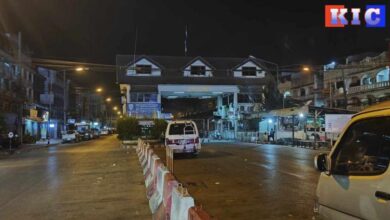International Rivers Day: Ethnic Groups Demand Govt To Halt Salween Dam Projects

Tens of thousands of people from Shan, Karenni, Karen and Mon State joined with over 100 civil society organisations and political parties to issue a petition on International Day of Action for Rivers to demand an immediate moratorium on Burmese Government plans to construct six dams on the Salween River.
The petition, organized by Burma Rivers Network (BRN), released today to mark International Day of Action for Rivers, was signed by 33,538 people from Karen, Mon, Shan and Karenni States and a further 131 political and community-based-organisations.
The six dam projects are in Shan, Karenni and Karen State and include projects at Nong Pa, Man Taung and Tasang in Shan State, Ywathit dam in Karenni State and Hatgyi dam in Karen State.
The dam projects have been linked to forced displacement of local landowners, environmental damage and Burma Army militarization, intensifying the concerns of ethnic people and civil society groups that the projects will come at the expense of human rights and endanger delicate peace talks between ethnic armed groups and the Burmese Government.
Burma Rivers Network is alliance of 15 community-based-organisations that advocates for the protection of Burma’s rivers. BRN pointed out in a media statement that the government has ignored international standards and not done enough to consult with the communities that will be affected by the proposed dams.
“All six Salween dams are proceeding in violation of international dam building standards, which should ensure transparency and respect for rights of affected communities. The dam sites are strictly guarded, and local people have been given no information about the projects. Downstream communities remain ignorant about impacts on water flows, fisheries and agriculture, as well the dangers of potential dam breaks.”
BRN alleged that the majority of the power produced by the six dam projects would not benefit Burma’s citizens and would threatened the livelihood of local communities.
“The Salween River is one of the longest free-flowing rivers in the world, and is the lifeblood of millions of ethnic people in Burma. The six dam projects with a combined capacity of about 15,000 megawatts, planned by Chinese, Burmese and Thai investors, are threatening the future of these people and the rich biodiversity of the Salween basin. Although the ones who will be most affected by the projects are the local communities living along the river, the majority of the generated electricity will go to China and Thailand, leaving very little or no benefits for these communities,” BRN said.
The Karenni Civil Soceity Network (KCSN) added to the calls for a moratorium by stating that the two dams planned for construction in Karenni territory raised many concerns.
“Even though Karenni State is quite small, there are 22 Burma Army Battalions stationed here, and the government has continued to construct the No14 military training centre, despite opposition from local people, which has caused concern about the government’s sincerity towards the peace process,” the KCSN said.
KCSN maintained that an increased Burma Army presence has led to human rights abuses.
“Since 2013, military training exercises from this centre have involved shelling of farmlands, killing livestock and making villagers too afraid to go out to their fields. Moreover, personnel from the training centre have committed sexual violence, including against a 10-year-old girl,” KCSN added.
In a February interview with Karen News, a spokesman from the Shan Human Rights Foundation (SHRF) claimed that the Kunlong Dam project had already led to the displacement of more than 20,000 villagers.
“Over 20,000 people have been affected from over 60 villages. But if you include the future construction of the road project then it could be well over 100 villages,” the spokesman said.
The spokesman warned that large dam projects like Kunlong presented a direct threat to a lasting peace in Burma.
“Right now even though there are ceasefire, no actual political settlement has been reached so the fighting hasn’t stopped… Without consulting the people and doing this before a lasting political settlement, it’ll be more confused and difficult to deal a peace because of the big projects.” The spokesman said, adding, “Because of the conflict in the area the Burmese troops have reinforced in the area. The fighting could break out anytime if they do not stop with the construction.”




